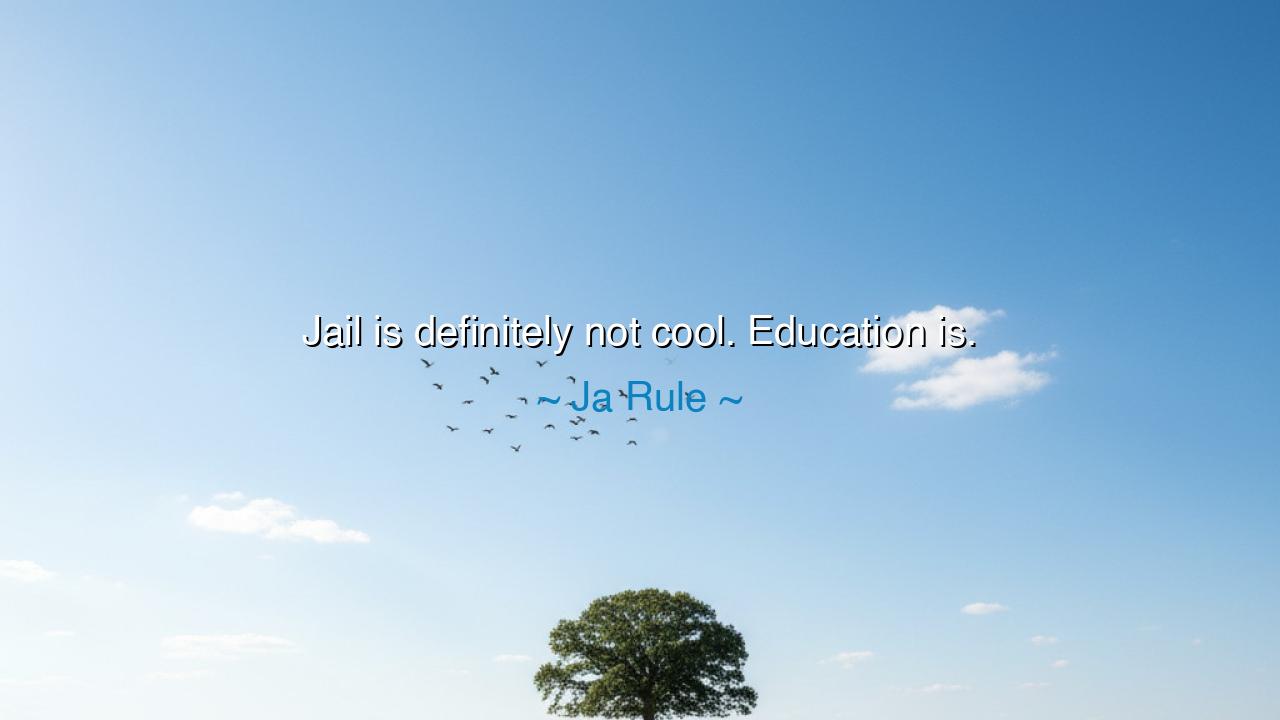
Jail is definitely not cool. Education is.






"Jail is definitely not cool. Education is." With these words, Ja Rule offers a simple yet powerful contrast between two paths—one that leads to confinement and limitation, and another that leads to freedom, growth, and empowerment. In this statement, he highlights the value of education as a gateway to a brighter future, a tool that empowers individuals to transcend their circumstances and achieve greatness. By stating that jail is not "cool," he reminds us that destruction of the self—whether through bad choices or a lack of knowledge—is a path that many choose but should not aspire to. Education, on the other hand, is the key to unlocking the potential of the mind and soul, offering the wisdom necessary to navigate the complexities of life and pursue a path of honor and purpose.
In the ancient world, education was revered as the path to wisdom and freedom. The Greeks, with their love of philosophy, saw knowledge as the light that illuminated the dark path of life. Socrates, perhaps the greatest teacher in history, believed that through self-knowledge and learning, individuals could break free from the chains of ignorance and achieve true freedom of thought. He taught that philosophy and education were not mere intellectual pursuits, but the means by which one could elevate oneself above the limitations of the material world. Socrates, who faced imprisonment and death for his beliefs, saw education as the only thing truly worth pursuing, and he viewed the ignorance of the masses as a prison far worse than any physical confinement.
Similarly, in the Roman world, education was the key to social mobility and power. Figures like Cicero and Virgil were not just revered for their eloquence, but for their intellectual pursuits that shaped the fabric of Roman society. Education allowed individuals to rise through the ranks, whether in politics, literature, or military service. The Romans understood that knowledge was a path to influence, and those who were educated were often seen as the guardians of wisdom and leaders of their time. The idea of jail, as Ja Rule mentions, was not just a physical space, but a metaphor for the imprisonment of the mind—a fate that could befall anyone who failed to seek knowledge and learning.
Consider the life of Frederick Douglass, who was born into slavery in the United States in the early 19th century. Despite being denied access to formal education, Douglass recognized the transformative power of learning. He taught himself to read and write, using education as his escape from the mental chains of slavery. Through his writings and speeches, he became one of the leading voices for the abolition of slavery and a champion of education as the key to personal and societal freedom. Douglass' life is a testament to the truth of Ja Rule's statement: education was his path out of the darkness, the means by which he gained liberation, not just for himself, but for millions.
The lesson Ja Rule imparts is simple yet profound. In a world where many are drawn to the allure of instant gratification, shortcuts, or destructive choices, we must remember that true power lies in knowledge and understanding. Jail, whether literal or figurative, is the consequence of being trapped in patterns of ignorance, poor decisions, or unfulfilled potential. Education, on the other hand, is the key that unlocks doors to freedom, prosperity, and personal growth. It allows us to rise above the circumstances that threaten to define us and gives us the tools to create new possibilities.
In practical terms, this means that we must prioritize learning, not just for the sake of earning degrees or achieving status, but for the sake of growth—growth of the mind, the spirit, and the character. Like Socrates and Douglass, we must see education not as a requirement, but as an opportunity—an opportunity to liberate ourselves and others from the confines of ignorance and to build a future that is defined by choice and empowerment. Education is not just about what we learn, but about how it shapes our understanding of the world and our place in it.
We must also recognize that the pursuit of education is not always easy. It requires dedication, discipline, and a willingness to face the challenges that come with learning. Yet, just as the greatest minds of the ancient world faced their own struggles, so too will we encounter difficulties. But each challenge is a step toward greater wisdom and freedom, and like Douglass, we must embrace education as the pathway to a life of greater purpose. Through learning, we become the architects of our own futures, masters of our own destinies, and ultimately, we become free—free from the chains of ignorance, free from the limitations of the past, and free to chart our own course toward success and fulfillment.






AAdministratorAdministrator
Welcome, honored guests. Please leave a comment, we will respond soon